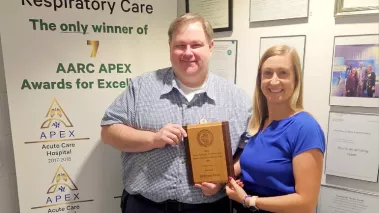As many as one in three children on Chicago’s West Side show early signs of mental health issues. Rush University Medical Center has been awarded a $3.5 million grant from the federal Substance Abuse and Mental Health Services Association to address this problem by increasing access to high quality, short-term early behavioral interventions. Through a collaborative of Rush care providers and community partners, the Building Early Connections effort is expected to help 40,000 children and their families.
“Roughly one quarter to a third of children in our West Side communities show signs of social emotional, developmental, or behavioral concerns. At the same time, the majority of these neighborhoods are considered to have low or very low access to early childhood education and health care facilities,” said Allie Wainer, PhD, assistant professor in the Department of Psychiatry and Behavioral Sciences at Rush Medical College and the study’s lead principal investigator.
“Parents on the West Side report that mental health services are a top priority,” Wainer noted. “Building Early Connections directly addresses this need by increasing capacity and developing coordinated systems of screening and intervention for the most common childhood concerns like anxiety, trauma, challenging behavior, and developmental issues.”
Shifting from watchful waiting to proactive solutions
By developing specialized promotion, screening and treatment services, Building Early Connections seeks to shift medical and educational provider perspectives on “watchful waiting” – monitoring a child’s condition but not providing treatment unless symptoms change – in favor of evidence-based proactive solutions designed to alter children’s developmental trajectories and strengthen their families. The program will focus on children 8 years old and younger, and their families, in West Side Chicago neighborhoods served by Rush University Medical Center. The program started on Aug. 31.
“The work outlined in this grant involves a close collaboration between providers in pediatrics and child psychiatry and behavioral sciences, and will surely have an impact on our community, services and training programs,” says Wainer. “We will capitalize upon current clinical efforts to link mental health and developmental screening in primary care with timely access to appropriate evidence-based interventions and community supports.”
The Medical Center expects to reach a racially and ethnically diverse population (50 percent black, 44.5 percent Latino and 13 percent foreign born) and to serve socioeconomically vulnerable individuals (75 percent of the population in the neighborhoods the program will reach is in the lowest census income bracket).
Building Early Connections will employ a multifaceted approach to build a continuum of care and scalable service delivery; to design training and consultation models that can be replicated in other communities; and to make a significant and enduring impact on mental health services and families in high-poverty communities. It is anticipated that the program will be able to offer screening, consultation and/or evidence-based intervention to 20,000 children and family members.
In addition, the program will collaborate with 28 community organizations and partners on the West Side of Chicago on mental health consultation and healthy development promotional activities to reach 40,000 children and family members in all.
Program will train hundreds of health care providers
Rush will train 170 primary care providers and 192 mental health providers who work on the West Side, expanding the pool of professionals who are using state-of-the-art screening and intervention practices. These enhanced capabilities will empower caregivers, enhance the caregiver-child relationship, and alter children’s developmental trajectories in a positive direction.
Building Early Connections outcomes will be assessed by the number of children served, number of Rush providers trained and number of community organizations partnered with for promotion and consultation.
“This program is the perfect example of our anchor mission coming to life,” Wainer says, referring to Rush’s commitment to using its resources to improve the socioeconomic conditions on the West Side that adversely affect the health of its residents. “It brings the power of academic medicine and research directly to people who need our help, right in our back yard. Our team is excited to begin and make an impact.”







